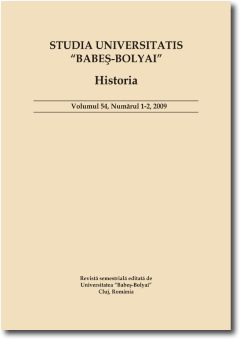“ABSOLUTISM WITHOUT COUNTER-REFORMATION”? THE CATHOLICIZATION OF PUBLIC TOWN OFFICES IN BISTRIŢA IN THE EIGHTEENTH CENTURY
“ABSOLUTISM WITHOUT COUNTER-REFORMATION”? THE CATHOLICIZATION OF PUBLIC TOWN OFFICES IN BISTRIŢA IN THE EIGHTEENTH CENTURY
Author(s): Sever Cristian OanceaSubject(s): History
Published by: Studia Universitatis Babes-Bolyai
Keywords: Eighteenth Century; Habsburgs; Transylvanian Saxons; Urbane Elites; Counter-Reformation; Absolutism.
Summary/Abstract: Outgoing from the Oxford historian Robert J. W. Evans’ thesis, Transylvania, “Absolutism without Counter-Reformation”, this study discusses the catholicization politics of Vienna in a small Saxon town of Transylvania, Bistriţa [Bistritz, Beszterce] during the eighteenth century. The model of description is the office as instrumentum regni, i.e. a vehicle of political and confessional control. The main assumption of the author is that the Habsburgs indeed succeeded to dismantle the old order, by first initiating a legislation that favored Catholics in obtaining high offices in the local town council and secondly implementing this legislation, by means of manifold interventions into the “free election” process. Such an approach enables us to seize how the modern “state” took over “control” on the local political affairs. Moreover, it shows that by means of catholicization, new elite was promoted, a Catholic group whose ascension was in no connection with the old patrician oligarchy of the town.
Journal: Studia Universitatis Babes-Bolyai - Historia
- Issue Year: 58/2013
- Issue No: 1
- Page Range: 71-94
- Page Count: 24
- Language: English

